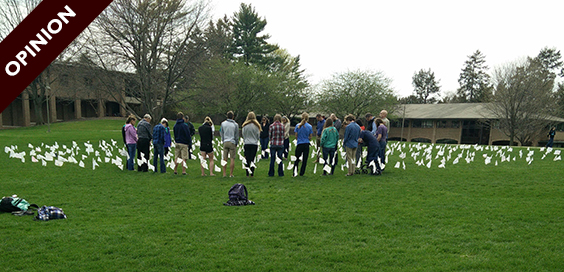This past week almost a thousand white flags stood in the center of Common’s lawn, representing the proportional number of people in Calvin’s community who will be a victim of sexual assault during their lifetime. One of the flags conveyed a particularly convicting statement: “No one should feel scared in a community of faith and learning. If one of us hurts, we all hurt.”
Most sexual assaults do not happen in an isolated place. Whether it’s an inappropriate sexual comment, touch or rape, most incidents or the threat of incidents are witnessed by others. We usually ask, or at least think of asking victims of sexual assault, “How could YOU let this happen?” rather than “How could WE let this happen in our community?”
This question is a huge part of why sexual violence persists. Those who witness signs or a threat of sexual assault and do nothing often respond with excuses like “I didn’t know what to do,” “I don’t want to make things worse” or “It isn’t my job,” feeling like they were incapable of stopping what was in progress.
Instead of making excuses, we need to recognize that the wellbeing of our friends and classmates is on us. Even if you weren’t present for the incident, if you heard about it or if you know one of the two people, you are a bystander and have a role to play in the situation. So what can we do to prevent the assault of our friends and classmates?
First, be aware and trust your instincts. Whether you are physically in a situation where you see signs of a potential sexual assault or hear about troubling details of a situation your friend experienced, pay attention to red flags that go off in your mind: things that just don’t look or sound right or don’t seem like something the person would normally be okay with doing.
Next, ask the person if they are okay, or if they need your help in any way. If they are, great; but if they seem uncomfortable or incapable of making a decision, you can diffuse the situation by separating them from the other person, getting in the way or directing their attention elsewhere. Make sure you and the person are safe and redirect them to a place that is safe. Don’t be afraid to ask someone else to help you in doing that. If intervening makes you feel fearful or uncomfortable, it is your responsibility to find someone who will take the step to intervene. If you can’t find anyone, you should try to intervene to the best of your ability.
Intervening is unique in every situation, but don’t be afraid to do something. On the other side of the spectrum, if one of your friends is initiating something that does not look or sound consensual, step in.
It’s important to have a conversation with your friends about your expectations for a situation and when they should step in. If you are in the moment and you believe they are not making a decision they normally would, you have the responsibility to ask them about it and make sure that they are okay.
They may be mad at you, but their anger or annoyance will go away faster than the deep pain that comes from both sides of a sexual assault.
Be bold. We are often so afraid to say the wrong thing or act when we aren’t wanted, but if we don’t say anything, we are failing to protect a person in a vulnerable place.
Preventing sexual assault goes beyond intervening in the moment, however. It requires a change in our culture that blasts degrading sexual imagery and innuendo everywhere — a culture that is very much existent at Calvin.
We need to become more vocal in our stance against sexual violence, and that comes by stopping friends when they say something inappropriate or degrading about another person. It comes by encouraging healthy, mutual relationships and conversations that build trust rather than destroy. If you want to learn more about how to do this, I strongly suggest watching the TED talk by Jackson Katz, “Violence against women — it’s a men’s issue.” Sexual assault at Calvin is real, and we all have a role to play in ending it.



